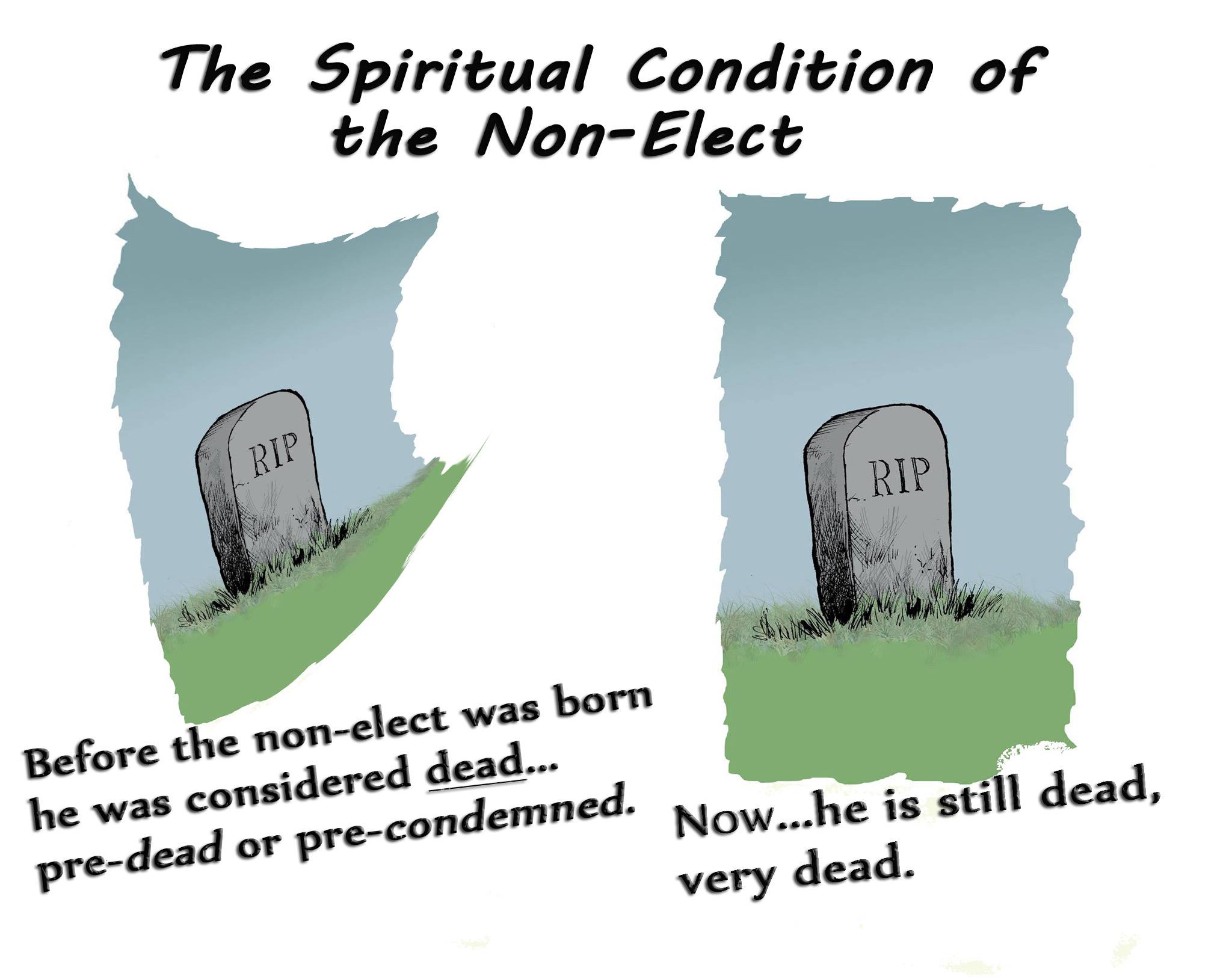What is Spiritual Death?
However, to a Calvinist, spiritual death means the cessation of life, which is verifiably false.
Ephesians 2:1-2: “And you were dead in your trespasses and sins, in which you formerly walked according to the course of this world, according to the prince of the power of the air, of the spirit that is now working in the sons of disobedience.”
But what about other indications of deadness:
Luke 15:22-24: “‘Quickly bring out the best robe and put it on him, and put a ring on his hand and sandals on his feet; and bring the fattened calf, kill it, and let us eat and celebrate; for this son of mine was dead and has come to life again; he was lost and has been found.’ And they began to celebrate.”
Notice how “dead” and “lost” are used interchangeably. His son was effectively dead to him, but without meaning cessation of life or annihilation of spirit.
Calvinists struggle when faced with the facts over what those in Luke 8 did, which was to “receive the word with joy” and to “believe for a while” before falling away. How do “dead” people do this? Calvinists have misunderstood the nature of deadness, because they ignore the facts. The facts are that Ephesians chapter 2 goes on to explain what is meant by deadness, as being separation: “Therefore remember that formerly you, the Gentiles in the flesh, who are called ‘Uncircumcision’ by the so-called ‘Circumcision,’ which is performed in the flesh by human hands— remember that you were at that time separate from Christ, excluded from the commonwealth of Israel, and strangers to the covenants of promise, having no hope and without God in the world. But now in Christ Jesus you who formerly were far off have been brought near by the blood of Christ. For He Himself is our peace, who made both groups into one and broke down the barrier of the dividing wall, by abolishing in His flesh the enmity, which is the Law of commandments contained in ordinances, so that in Himself He might make the two into one new man, thus establishing peace, and might reconcile them both in one body to God through the cross, by it having put to death the enmity.” (Ephesians 2:11-16) Also notice that Paul does not say that since once is spiritually dead, they cannot believe in the gospel apart from preemptive regeneration or by first being secretly made Born Again.
One Calvinist explains: “Is the unregenerate man ‘dead’? Has he been wounded? … The sinner is dead in trespasses and sins. Now what can a ‘dead mean’ do? Can a dead man believe? Can a dead man repent? Can a dead man come? No! He’s dead; he’s absolutely dead. When men are born, they are naturally and spiritually dead in trespasses and sins, and they cannot come to Christ. No man can come to Me, except the Father which has sent Me, draw him, and that’s Scripture, that’s not a creed. That’s Scripture. All that the Father gives Me, John 6:37, all that the Father gives Me, they’re going to come to Me; nobody else is going to come, because it takes the work of the Holy Spirit to regenerate, to give life, before a man can believe and repent, a dead man cannot do anything.” (Line of Fire, emphasis mine)
The Calvinist is not asking the right questions. The issue is not of inability, but of judicial condemnation. Furthermore, Paul does not ask in Ephesians, “Can a dead man repent?” The reason why is because the question itself is alien to Paul’s point on deadness.
Nevertheless, although it is a Scripture verse, namely John 6:37 and John 6:44, it is cited acontextually as a simple proof-text, built upon the concept of spiritual deadness at Ephesians 2:1, which is also cited acontextually. Therefore, the whole thing might as well be a creed. Looking at Ephesians 2:1, where does it ever ask the question: “What can a dead man do?” Looking at John 6:44, where does it ever say that the Holy Spirit must regenerate? The Calvinist superimposes his own creeds upon Scripture, in order to declare it Scripture. Here is what Ephesians 2:11-13 actually does say about deadness: “Therefore remember that formerly you, the Gentiles in the flesh, who are called ‘Uncircumcision’ by the so-called ‘Circumcision,’ which is performed in the flesh by human hands--remember that you were at that time separate from Christ, excluded from the commonwealth of Israel, and strangers to the covenants of promise, having no hope and without God in the world. But now in Christ Jesus you who formerly were far off have been brought near by the blood of Christ.” The contextual concept of deadness, according to Ephesians 2:1-13, is not an inability to receive God’s gift to return to Him, but separation. In fact, if we really do want to look at the question of “what can a dead man do,” although this is not addressed at Ephesians 2:1, it can be found in the parable of the Prodigal Son, whom his father called “dead” and now alive: “‘Quickly bring out the best robe and put it on him, and put a ring on his hand and sandals on his feet; and bring the fattened calf, kill it, and let us eat and celebrate; for this son of mine was dead and has come to life again; he was lost and has been found.’ And they began to celebrate.” (Luke 15:22-24) Once again, we see spiritual deadness in terms of separation from God, rather than an inability to receive His gift to return to Him.
When Jesus discussed spiritual death, it was in
terms of separation, as related in the parable of
the Prodigal Son, when the father stated:
“‘Quickly bring out the best robe and put it on
him, and put a ring on his hand and sandals on
his feet; and bring the fattened calf, kill it, and
let us eat and celebrate; for this son of mine was
dead and has come to life again; he was lost and
has been found.’ And they began to celebrate.”
(Luke 15:22-24) This concept betrays the
Calvinistic perspective, because the son was
alive, though dead in terms of separation.
One member of The Society of Evangelical Arminians: “Throughout Scripture, ‘spiritual death’ refers to SEPARATION (i.e. at death the spirit separates from the body, at the second death the non-believer is eternally separated from God). Adam and Eve were created in relationship with God. Then when they sinned, their sin separated them from God (hence they died spiritually as soon as they sinned, but their physical or bodily death happened years later. Physical death is a consequence of spiritual death). All born after the fall (except for Jesus) are born out of relationship with God or spiritually dead.”
Analogy: Imagine a lamp connected to a light
socket via a plug and wire.
As long as the plug is in the wall and functioning
normally the light will be on. But what if all other
lamps of this same design are produced with the
same wire and plug, and yet they are not plugged
in, no light will go on, it is impossible for that light
to go on. We are born like lamps that are all
unplugged and disconnected from the light source,
so we are all born with no light. Conversion is when
God plugs us back into the light plug and so we can
then have light again. We cannot plug ourselves in
the plug; God alone does it, and He does it with
His people, those who trust him who are believers.
In the case of Jesus, He was plugged in from birth.
He never experienced separation from God as we
do from birth.”
The ‘sin nature’ refers to what we are like living apart from and separated from God. While I certainly believe sin is real, and being apart from God means you will act like a sinner and both be born apart from God (due to Adam’s sin) and then live apart from God (your own personally chosen sins), I don’t have to worry about the debate between traducianists and creationists about how the ‘sin nature’ is transferred or whether or not God creates souls that are already sinful, etc. etc.”
Calvinist, Paul Washer: “But, a man who will not accept his illness will not be healed. A man who does not have all his hopes crushed with regard to his own self-righteousness, merit and worth cannot turn to Christ.” (Total Depravity/Gospel, emphasis mine)
In other words, a person who does not admit that he is a sinner, and stands guilty before God, cannot get plugged into God, and I agree.
- What if a man does accept his illness? Does that mean that he can be healed?
- What if a man does have his hopes crushed, with regard to his own self-righteousness, merit and worth? Does it mean that he has the proper frame of mind so that he can repent?
If a Calvinist insisted that both of these things were necessary, but futile without a preemptive regeneration, in being preemptively made Born Again with an irresistible grace, then why would he even bring it up in the first place? Is Paul Washer borrowing from Arminianism, in order to prove Calvinism? In Arminianism, God reaches out and convicts and enables the lost, unregenerate person, so that he can be saved, so that he can become plugged into God. But in Calvinism, God takes the unregenerate person, and secretly makes them regenerate, so that they inevitably turn to Christ. According to Calvinism, therefore, only those who receive an irresistible grace, receive the knowledge that they are sinners and stand guilty before God. But why should we conclude that? Why can’t anyone who hears the Gospel, come to this conclusion (Romans 10:17), and therefore, be in a frame of mind so that they can repent? Even sinful people recognize that they are in error and stand guilty as charged. The question is whether or not they love their sin more than a relationship with God. The fact that they recognize their guilt, stands as evidence that they are in a sufficient frame of mind so that they can repent, if they choose to do so.
One member of The Society of Evangelic Arminians: “Where Calvinists make an error in their understanding of Total Depravity, is that they try to develop a CONCEPTION of depravity in which the sinner is unable to have a faith response to the Gospel, and so must first be regenerated in order for them to be saved. Now this contention goes way beyond the Bible and ends up with further proof- texting, trying to show that regeneration precedes faith. Where we should nip it in the bud, is to affirm what the Bible says about SIN AND ITS EFFECTS, and then carefully distinguish THAT from the further additions of the Calvinists. Some other further additions by the Calvinists (besides the addition that depravity makes you incapable of a faith response to the gospel unless first regenerated) include the claims that (1) sinners cannot do any good whatsoever (this is argued because again the goal is to eliminate the possibility of a non-believer having faith in the gospel), (2) that sinners are as bad as they can be, (3) that sinners are not as bad as they could be because of God’s ‘common grace’ (which supposedly reigns them in a bit, but what Bible verses say that common grace limits sin? Romans 1 says the opposite that God gives people who reject him over to sin so their sin increases!) (4) that the sinner is like a physically dead corpse incapable of understanding spiritual truths whatsoever, (5) that because of sin people no longer have free will (if free will is simply having and making choices then while it is true that all are sinners, it is not true that all no longer have choices!), etc. All of the misunderstandings about ‘total depravity’ stem from going beyond the biblical data, because they are trying to create sinners who cannot believe unless regenerated first.”
Question: What is Spiritual Death?
Answer: Separation from God.


